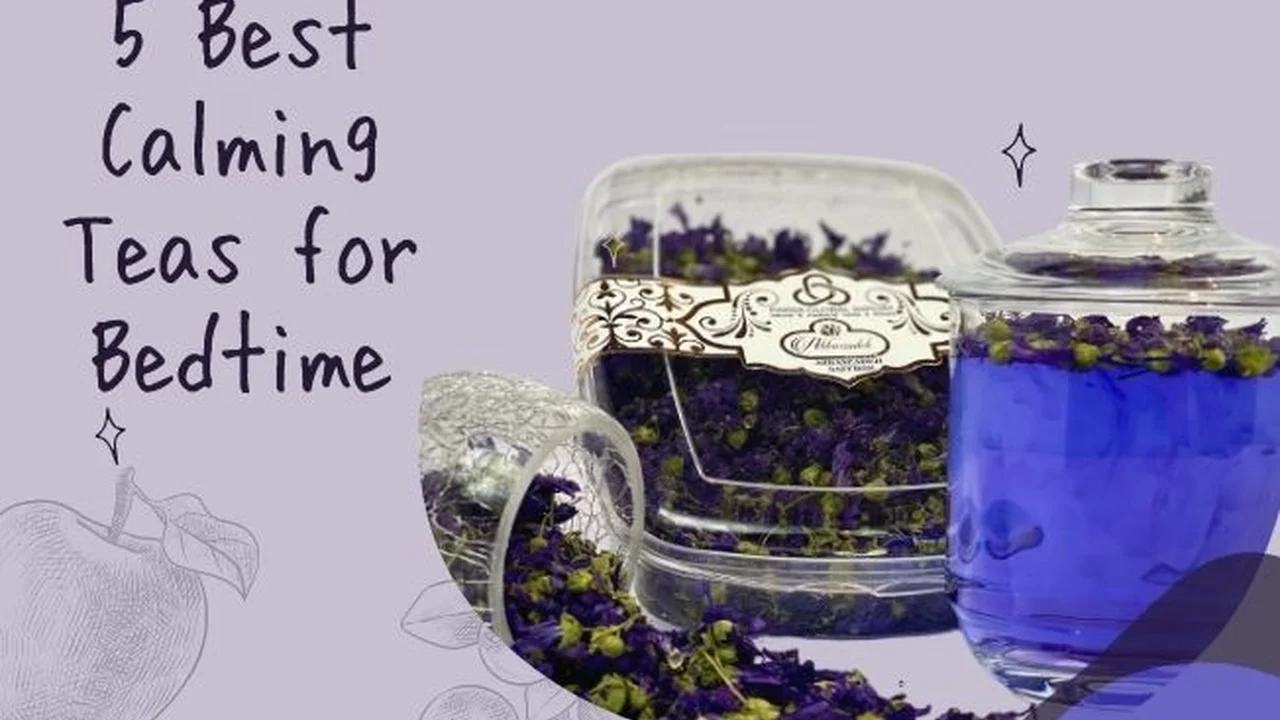The Best Teas for Sleep: Calming Brews for Bedtime
Sample meta description.

Introduction to Sleep and the Power of Herbal Teas for Relaxation
Hey there, sleep seekers! Struggling to catch those precious Zzz's? You're not alone. Millions of us toss and turn, battling insomnia and restless nights. But before you reach for that prescription bottle, let's explore a natural, delicious, and often overlooked solution: herbal teas. For centuries, people have used these calming concoctions to soothe their minds and bodies, preparing them for a night of restful sleep. We're going to dive deep into the world of sleep-inducing teas, uncovering the best brews to help you drift off to dreamland. Think of this as your ultimate guide to finding your perfect bedtime tea – no more counting sheep!
Understanding the Science Behind Sleep Teas and Their Benefits
So, what makes these teas so effective? It's all about the magic ingredients. Many herbal teas contain compounds that interact with your brain and nervous system, promoting relaxation and reducing anxiety. For example, chamomile contains apigenin, an antioxidant that binds to certain receptors in your brain, potentially decreasing anxiety and initiating sleep. Lavender is known for its calming aroma, which can slow down your heart rate and lower blood pressure. And valerian root, a more potent herb, has been shown to increase the amount of GABA (gamma-aminobutyric acid) in the brain, a neurotransmitter that helps regulate nerve impulses and promote relaxation. Beyond just helping you fall asleep, these teas can also improve sleep quality, reduce nighttime awakenings, and leave you feeling refreshed in the morning. Pretty amazing, right?
Top 5 Teas for Sleep and Relaxation: A Detailed Guide
Alright, let's get down to the specifics! Here are five of the best teas for sleep, along with their unique benefits and what to look for when choosing them:
-
Chamomile Tea for Sleep and Anxiety Relief
Chamomile is arguably the most well-known and widely used sleep tea. Its gentle, floral flavor is incredibly soothing, and its calming properties are backed by science. It's a great choice for those who experience mild anxiety or have trouble winding down after a long day. Look for organic chamomile tea bags or loose leaf chamomile flowers for the best quality. Avoid teas with added flavors or artificial ingredients.
-
Lavender Tea for Relaxation and Stress Reduction Before Bed
Lavender tea offers a delightful floral aroma and a subtly sweet taste. It's known for its ability to reduce stress and anxiety, making it an excellent choice for those who struggle with racing thoughts before bed. You can find lavender tea on its own or blended with other herbs like chamomile or lemon balm. Be mindful of the strength, as too much lavender can sometimes have a slightly bitter taste. A little goes a long way!
-
Valerian Root Tea for Deep Sleep and Insomnia Support
Valerian root is a more potent herb that's often used to treat insomnia. It has a distinctive earthy aroma that some people find unpleasant, but its sleep-inducing effects are undeniable. Valerian root tea can be quite strong, so start with a small dose and gradually increase it as needed. It's also important to note that valerian root can interact with certain medications, so it's best to consult with your doctor before using it regularly.
-
Lemon Balm Tea for Calming Nerves and Promoting Restful Sleep
Lemon balm is a member of the mint family and has a refreshing citrusy flavor. It's known for its calming and uplifting properties, making it a great choice for those who experience anxiety or depression that interferes with their sleep. Lemon balm tea is often blended with other herbs like chamomile or lavender to create a synergistic effect. It's also a good option for children who have trouble sleeping, as it's generally considered safe and gentle.
-
Passionflower Tea for Anxiety Relief and Improved Sleep Quality
Passionflower is a beautiful flowering vine that has been used for centuries to treat anxiety and insomnia. It contains compounds that may help increase GABA levels in the brain, promoting relaxation and reducing anxiety. Passionflower tea has a slightly earthy and grassy flavor. It's often combined with other herbs like chamomile or valerian root to enhance its sleep-inducing effects.
Specific Product Recommendations for Sleep Teas: Brands, Pricing, and Where to Buy
Okay, now that you know the best teas for sleep, let's talk about specific products. Here are a few of my top recommendations, based on quality, effectiveness, and value:
-
Traditional Medicinals Organic Chamomile Tea: A Classic Choice for Bedtime
Price: Around $5 for a box of 16 tea bags.
Where to Buy: Most grocery stores, health food stores, and online retailers like Amazon.
Pros: Readily available, affordable, organic, and consistently high quality. A reliable choice for a gentle and calming bedtime tea.
Cons: The flavor can be a bit mild for some people.
Usage Scenario: Perfect for a relaxing evening ritual before bed. Brew a cup about 30 minutes before you plan to sleep.
-
Pukka Herbs Night Time Tea: A Blend of Lavender, Chamomile, and Valerian
Price: Around $7 for a box of 20 tea bags.
Where to Buy: Health food stores, some grocery stores, and online retailers like Amazon.
Pros: A delicious and effective blend of calming herbs. The lavender and chamomile provide a gentle relaxation, while the valerian root adds a more potent sleep-inducing effect.
Cons: The valerian root flavor can be a bit strong for some people. It's also slightly more expensive than some other options.
Usage Scenario: Ideal for those who need a little extra help falling asleep or who experience more severe insomnia.
-
Celestial Seasonings Sleepytime Tea: A Budget-Friendly and Widely Available Option
Price: Around $4 for a box of 20 tea bags.
Where to Buy: Most grocery stores and online retailers.
Pros: Inexpensive, widely available, and has a pleasant, slightly sweet flavor. A good option for those on a budget or who are new to sleep teas.
Cons: Not organic, and the ingredient list includes some added flavors. May not be as potent as some other options.
Usage Scenario: A good everyday tea for relaxation and promoting sleep. Enjoy a cup after dinner to help you wind down.
-
Davidson's Organic Tulsi Lavender Tea: A Unique and Aromatic Blend
Price: Around $10 for a box of 16 tea bags.
Where to Buy: Health food stores and online retailers like Amazon.
Pros: Organic, combines the benefits of tulsi (holy basil) and lavender, creating a unique and aromatic blend. Tulsi is an adaptogen, which helps the body cope with stress.
Cons: More expensive than other brands. The tulsi flavor might not be for everyone.
Usage Scenario: Best for those looking for stress relief and a calming bedtime ritual.
-
Numi Organic Tea Rooibos Chai: A Caffeine-Free Spicy Option for Relaxation
Price: Around $8 for a box of 18 tea bags.
Where to Buy: Health food stores and online retailers like Amazon.
Pros: Organic, caffeine-free, and offers a warming, spicy flavor profile. Rooibos is naturally caffeine-free and rich in antioxidants. Chai spices like cinnamon and cardamom can be soothing.
Cons: It doesn't contain the traditional sleep-promoting herbs like chamomile or lavender. It’s the chai spices might be too stimulating for some before bed.
Usage Scenario: Best for those looking for a relaxing and flavorful caffeine-free alternative to traditional chai. It's good for unwinding in the evening, especially during colder months.
Comparing Different Sleep Teas: Flavor Profiles, Potency, and Potential Side Effects
Choosing the right sleep tea can be a bit overwhelming, so let's break down the key differences between the options we've discussed:
- Flavor: Chamomile is floral and gentle, lavender is floral and slightly sweet, valerian root is earthy and strong, lemon balm is citrusy and refreshing, and passionflower is earthy and grassy. Consider your personal preferences when choosing a tea.
- Potency: Valerian root is generally considered the most potent sleep tea, followed by passionflower. Chamomile, lavender, and lemon balm are milder and better suited for those who need gentle relaxation.
- Potential Side Effects: Chamomile and lavender are generally considered safe for most people. Valerian root can cause drowsiness, dizziness, and stomach upset in some individuals. Lemon balm may interact with certain medications. It's always best to consult with your doctor before using herbal teas regularly, especially if you have any underlying health conditions or are taking medications.
How to Brew the Perfect Cup of Sleep Tea: Temperature, Steeping Time, and Additives
Brewing the perfect cup of tea is an art! Here are some tips to ensure you get the most out of your sleep tea:
- Water Temperature: Most herbal teas should be brewed with water that's just below boiling (around 200-212°F or 93-100°C).
- Steeping Time: Steep the tea for 5-7 minutes, depending on the type of tea and your personal preference. Longer steeping times will result in a stronger flavor.
- Additives: While some people enjoy their tea plain, others prefer to add a touch of sweetness or flavor. A small amount of honey or lemon can enhance the taste of your tea, but avoid adding too much sugar, as it can interfere with sleep. A splash of milk or cream can also make your tea more comforting.
Creating a Bedtime Ritual with Tea: Tips for a Relaxing Evening Routine
Drinking sleep tea is just one part of creating a relaxing bedtime ritual. Here are some other tips to help you prepare for a good night's sleep:
- Establish a consistent sleep schedule: Go to bed and wake up at the same time every day, even on weekends.
- Create a relaxing bedtime routine: Take a warm bath, read a book, or listen to calming music.
- Avoid caffeine and alcohol before bed: These substances can interfere with sleep.
- Create a dark, quiet, and cool sleep environment: Use blackout curtains, earplugs, or a white noise machine to minimize distractions.
- Limit screen time before bed: The blue light emitted from electronic devices can suppress melatonin production, making it harder to fall asleep.
Beyond Tea: Other Natural Remedies for Sleep and Relaxation
While tea is a fantastic tool, there are other natural remedies that can complement your efforts to get a good night's sleep. Consider incorporating these into your routine:
- Meditation and mindfulness: Practicing meditation or mindfulness can help quiet your mind and reduce stress.
- Deep breathing exercises: Deep breathing exercises can activate the parasympathetic nervous system, promoting relaxation.
- Aromatherapy: Essential oils like lavender, chamomile, and sandalwood can be diffused or applied topically to promote relaxation.
- Magnesium supplements: Magnesium is a mineral that plays a role in sleep regulation. A magnesium supplement may help improve sleep quality. (Consult with your doctor before starting any new supplements.)
- Regular exercise: Regular exercise can improve sleep quality, but avoid exercising too close to bedtime.
Troubleshooting Sleep Problems: When to See a Doctor and Other Resources
If you've tried these tips and are still struggling with sleep problems, it's important to consult with your doctor. They can help rule out any underlying medical conditions and recommend appropriate treatment options. There are also many helpful resources available online and in your community, such as sleep clinics, support groups, and books on sleep hygiene.
Final Thoughts: Embrace the Power of Tea for a Better Night's Sleep
So, there you have it! A comprehensive guide to the best teas for sleep. Experiment with different types of tea, find the ones you enjoy the most, and incorporate them into your nightly routine. With a little patience and experimentation, you can unlock the power of tea to improve your sleep and wake up feeling refreshed and energized. Sweet dreams!
:max_bytes(150000):strip_icc()/277019-baked-pork-chops-with-cream-of-mushroom-soup-DDMFS-beauty-4x3-BG-7505-5762b731cf30447d9cbbbbbf387beafa.jpg)






